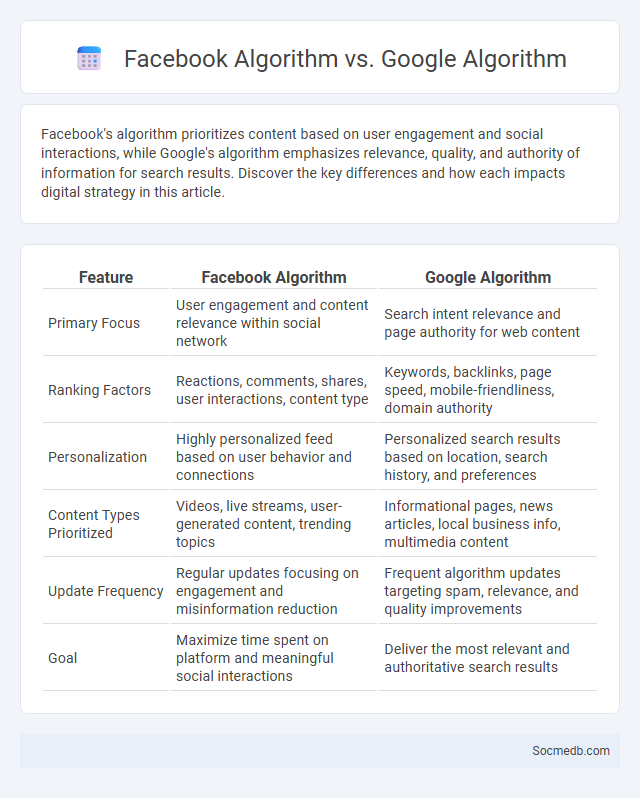
Photo illustration: Facebook Algorithm vs Google Algorithm
Facebook's algorithm prioritizes content based on user engagement and social interactions, while Google's algorithm emphasizes relevance, quality, and authority of information for search results. Discover the key differences and how each impacts digital strategy in this article.
Table of Comparison
| Feature | Facebook Algorithm | Google Algorithm |
|---|---|---|
| Primary Focus | User engagement and content relevance within social network | Search intent relevance and page authority for web content |
| Ranking Factors | Reactions, comments, shares, user interactions, content type | Keywords, backlinks, page speed, mobile-friendliness, domain authority |
| Personalization | Highly personalized feed based on user behavior and connections | Personalized search results based on location, search history, and preferences |
| Content Types Prioritized | Videos, live streams, user-generated content, trending topics | Informational pages, news articles, local business info, multimedia content |
| Update Frequency | Regular updates focusing on engagement and misinformation reduction | Frequent algorithm updates targeting spam, relevance, and quality improvements |
| Goal | Maximize time spent on platform and meaningful social interactions | Deliver the most relevant and authoritative search results |
Introduction to Algorithms: Facebook vs Google vs General
Algorithms drive the functionality of social media platforms by determining content visibility and user engagement. Facebook's algorithms prioritize personalized content based on social connections and user interactions, while Google's algorithms focus on search intent and relevance to deliver targeted ads and search results. Understanding these differences helps you optimize your social media strategies for maximum reach and impact across diverse digital ecosystems.
Core Principles of Facebook Algorithm
Facebook's algorithm prioritizes content based on meaningful interactions, relevancy, and user engagement metrics such as comments, shares, and reactions. It evaluates the type of content you interact with, giving higher visibility to posts that foster genuine conversations and personal connections. Ensuring your posts align with these core principles can significantly enhance your reach and engagement on the platform.
Core Principles of Google Algorithm
Google's algorithm prioritizes high-quality, relevant content that matches user intent, ensuring your social media posts are informative and engaging. Emphasizing natural language use, keyword relevance, and authoritative sources helps increase visibility and rank. Optimizing your content with these core principles boosts your social media presence and drives organic traffic effectively.
Defining a General Algorithm
A general social media algorithm prioritizes content by analyzing user interactions, such as likes, shares, comments, and viewing time, to personalize feeds and enhance engagement. It employs machine learning models that continuously adapt based on real-time data, predicting what content users are most likely to engage with. This dynamic filtering optimizes user experience by surfacing relevant posts while minimizing less relevant or repetitive content.
Key Differences: Facebook vs Google Algorithms
Facebook algorithms prioritize user engagement by analyzing interactions such as likes, comments, and shares to deliver personalized content within social networks. Google's algorithms emphasize search intent and relevance by indexing vast amounts of content and using factors like backlinks, keywords, and site authority to rank pages in search results. While Facebook's algorithm optimizes for social interaction and content virality, Google focuses on providing the most authoritative and relevant information based on user queries.
How Facebook Algorithm Affects Content Visibility
Facebook's algorithm prioritizes content based on user engagement, relevance, and timeliness, significantly impacting content visibility. Posts with higher likes, comments, and shares are more likely to appear in users' news feeds, while content deemed less engaging faces reduced exposure. Understanding algorithm updates and optimizing posts for audience interaction can enhance reach and visibility on the platform.
How Google Algorithm Impacts Search Results
Google's algorithm analyzes various factors such as keyword relevance, user engagement, and content quality to determine social media content rankings in search results. Your social media posts with authentic interactions, timely updates, and optimized keywords are more likely to achieve higher visibility on Google's search engine. Understanding and leveraging this algorithm can boost your online presence and drive targeted traffic effectively.
Similarities Between Facebook and Google Algorithms
Facebook and Google algorithms both prioritize personalized content delivery by analyzing user behavior, preferences, and engagement patterns to enhance user experience. Both platforms utilize machine learning techniques and vast data sets to optimize content ranking, ensuring relevant posts or search results appear prominently. Their algorithms continuously evolve, incorporating real-time feedback and signals such as clicks, likes, and shares to refine content visibility and user interaction.
Algorithm Updates: Facebook vs Google
Facebook's algorithm updates prioritize user engagement through personalized content and community interactions, enhancing relevance in News Feed rankings by analyzing behavior patterns and interests. In contrast, Google's algorithm updates, such as those in Core Web Vitals and BERT, emphasize content quality, search intent, and page experience to improve search result relevancy and user satisfaction. Both platforms continuously refine their algorithms using machine learning to optimize content delivery, but Facebook centers on social signals while Google focuses on relevance and technical SEO factors.
Future Trends in Algorithm Development
Future trends in social media algorithm development emphasize enhanced personalization through advanced machine learning models that analyze user behavior in real-time. These algorithms will prioritize authentic content engagement and reduce misinformation by incorporating sophisticated natural language processing and image recognition technologies. Understanding these changes helps your content reach the right audience more effectively, ensuring deeper connections and higher visibility.
 socmedb.com
socmedb.com